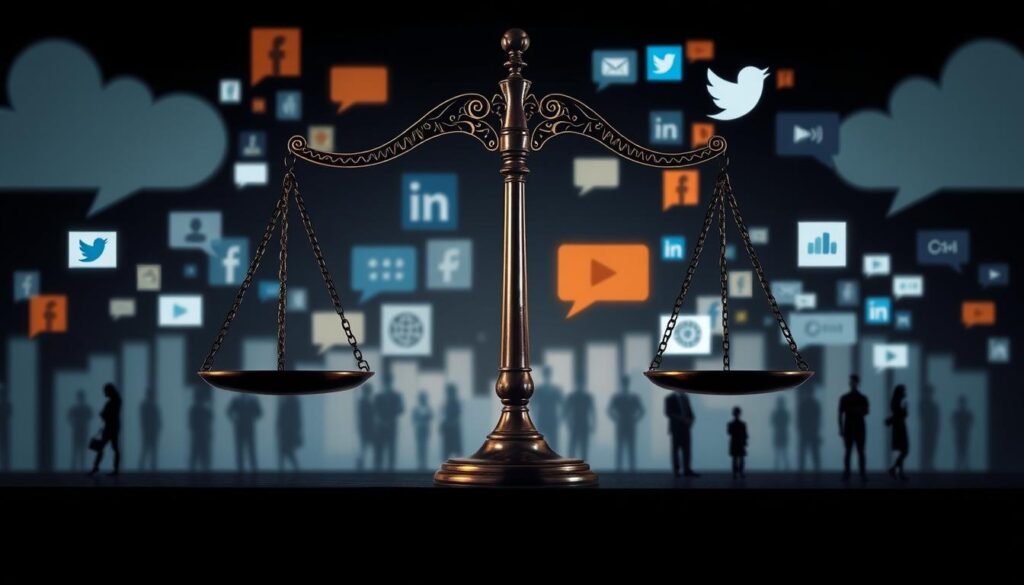In today’s fast-paced digital world, a crisis can quickly escalate into a full-blown reputation crisis, threatening the very foundation of your business.
We understand that crisis management requires a dual focus: resolving the issue while protecting your organization’s public image through strategic communications. At Reputation Return, we can help you navigate the complex terrain of crisis situations, from assembling the right team to implementing response protocols that protect both your reputation and your business.
Your consultation is free and confidential. We’ll explore how to protect your organization’s reputation and emerge from challenges with your business intact.
Key Takeaways
- Understand the importance of dual focus in crisis management: resolving the issue and protecting public image.
- Learn how to navigate complex crisis situations effectively.
- Discover the role of strategic communications in protecting your organization’s reputation.
- Find out how Reputation Return can assist you in managing crisis situations.
- Take advantage of a free and confidential consultation to discuss your needs.
Understanding Legal Crisis Communication
In today’s complex business environment, understanding legal crisis communication is crucial for protecting your company’s reputation. A legal crisis can arise from various sources, including government investigations, major lawsuits, data breaches, or allegations of misconduct. Effective communication during such times is vital to mitigate potential damage.
What Constitutes a Legal Crisis
A legal crisis encompasses any situation with legal implications that threatens an organization’s operations, financial stability, or public standing. This can range from regulatory investigations and lawsuits to product liability issues and executive misconduct allegations. Key characteristics include intense public scrutiny, threats to business continuity, and potential long-term damage to the organization’s reputation.
- A government investigation or adverse regulatory action
- A major lawsuit or product recall
- An allegation of executive or employee misconduct
- A data breach or health, safety, and environment incident
The Impact of Legal Crises on Business Reputation
Legal crises can have a devastating impact on business reputations by eroding stakeholder trust, damaging brand equity, and creating lasting negative associations. The effects extend beyond the courtroom, influencing customer loyalty, employee morale, investor confidence, and relationships with regulators and the community. Effective crisis management and communication strategies are essential to mitigate these effects and protect the company’s public standing.
| Impact Area | Potential Consequences |
|---|---|
| Customer Loyalty | Loss of trust, decreased sales |
| Employee Morale | Decreased productivity, increased turnover |
| Investor Confidence | Stock price volatility, reduced investment |
By understanding the nature of legal crises and their potential impact, businesses can better prepare for and respond to such challenges, ultimately protecting their reputation and ensuring continuity.
Learn how Reputation Return can help make court, legal, and news articles related to your legal issues disappear. Your consultation is free and confidential.
The High Stakes of Reputation Management During Legal Challenges
The importance of effective reputation management during legal challenges cannot be overstated. Companies facing legal crises must navigate not only the legal complexities but also the potential damage to their reputation. A well-managed crisis response can mitigate financial losses and protect stakeholder trust.

Financial Implications of Reputational Damage
The financial stakes of reputation management during legal challenges are significant. Research indicates that companies responding ineffectively to crises can experience an average decline of 14% in stock price and a $16 billion drop in market capitalization over two years. In contrast, companies that respond effectively can maintain their stock price and market valuation. The speed of response is critical, with companies responding within hours experiencing only a 4% stock price decline compared to a 14% decline for those taking weeks to respond.
Beyond the immediate financial impacts, reputational damage can lead to increased regulatory scrutiny, higher costs of capital, and difficulty attracting talent. The rise of social media has intensified the effect of crises on an organization’s reputation, with studies showing that the financial impact of crises has roughly doubled in the social media era.
Long-term Effects on Stakeholder Trust
The long-term effects of reputational damage on stakeholder trust can be profound. Stakeholder trust, once damaged, can take years to rebuild, affecting relationships with customers, employees, investors, partners, and regulators long after the legal matter is resolved. Effective crisis management and communications are crucial to maintaining stakeholder trust. Companies that manage their reputations effectively during legal challenges can not only prevent losses but potentially gain approximately 20% in shareholder value in the year following a well-handled crisis.
At Reputation Return, we understand the importance of protecting your reputation during legal challenges. Our team is dedicated to helping you navigate these complex situations. We offer a free and confidential consultation to discuss your needs and develop a tailored strategy to safeguard your reputation.
Building a Legal Crisis Communication Strategy
In the face of a legal crisis, having a well-structured communication strategy can make all the difference. A comprehensive crisis communication plan enables companies to respond swiftly and effectively, mitigating potential damage to their reputation.
To develop an effective legal crisis communication strategy, it’s essential to start with the basics. This involves understanding the key components that will help you navigate a crisis successfully.
Assembling Your Crisis Management Team
Building an effective legal crisis communication strategy begins with assembling a core crisis management team. This team should include senior leadership, legal counsel, communications professionals, and relevant operational experts who can respond swiftly when a crisis emerges.
- Your crisis management team should be established before any crisis occurs, with clearly defined roles, responsibilities, and decision-making authority.
- The team should include representatives from key departments, such as operations, compliance, human resources, government relations, and investor relations.
- A well-structured team will enable your company to assess and monitor the situation, developing a unified response strategy.
By having a dedicated crisis management team in place, companies can ensure a rapid and coordinated response to legal crises, minimizing potential reputational damage. For more information on how to effectively manage legal communications during a crisis, visit our page on Legal Communications Strategy.
Developing Response Protocols Before Crisis Strikes
Developing comprehensive response protocols in advance is crucial. These protocols should include communication templates, approval processes, stakeholder contact lists, and escalation procedures tailored to different types of legal crises.
- Effective crisis communication strategies balance legal protection with transparency, acknowledging the situation while managing what information is shared.
- Regular crisis simulation exercises and tabletop drills help ensure your team can execute the response plan effectively when a real crisis strikes.
- A well-designed crisis communication strategy should anticipate various scenarios, preparing messaging frameworks that can be adapted quickly.
By proactively developing response protocols, companies can significantly enhance their ability to manage legal crises effectively, protecting their reputation and maintaining stakeholder trust.
The Critical Partnership Between Legal and Communications Teams
In the face of a legal crisis, the partnership between legal and communications teams becomes a crucial element in protecting a company’s reputation. This partnership is not just about coordinating responses; it’s about creating a unified strategy that balances legal protection with transparency.
The core crisis management team should serve as a convener of expertise from within the company, bringing together relevant stakeholders and ensuring that all necessary information and perspectives are considered. The central legal-communications partnership plays a key role in developing the strategy, managing its implementation, and adapting the plan as needed.
Balancing Legal Protection with Transparency
Balancing legal protection with transparency is a sophisticated task that requires careful consideration of what information can be shared, when it should be released, and how it should be framed. Legal teams focus on minimizing liability, while communications teams prioritize transparency and stakeholder relationships, making their coordination essential for a balanced approach.
Effective legal-communications partnerships establish clear protocols for information sharing, message approval, and decision-making authority. This ensures that both legal constraints and communications needs are respected. As noted by experts, “the most successful companies integrate their legal and communications functions during crisis planning, not just during active crises, building relationships and mutual understanding before high-pressure situations arise.”
“The partnership between legal and communications teams forms the keystone of effective crisis management, supporting all other components of the response effort and largely determining whether the company’s strategy will succeed.”
Creating Unified Messaging Across All Channels
Creating unified messaging across all channels requires careful coordination to ensure that statements made in press releases, social media, internal communications, and legal filings are consistent and mutually supportive. This involves developing a comprehensive communications strategy that aligns with the company’s legal strategy.
| Channel | Message | Objective |
|---|---|---|
| Press Releases | Official statement on the crisis | Inform stakeholders |
| Social Media | Consistent updates and responses | Engage with stakeholders |
| Internal Communications | Detailed information for employees | Keep employees informed |
| Legal Filings | Official legal responses | Address legal requirements |
By integrating legal and communications strategies, companies can navigate legal crises more effectively, protecting their reputation and maintaining stakeholder trust. Learn how Reputation Return can help your company manage legal crises and protect your online reputation through our free and confidential consultation.

Implementing Effective Legal Crisis Communication

When a legal crisis strikes, a company’s response can make all the difference in preserving its reputation. Effective legal crisis communication is not just about responding to the crisis; it’s about doing so in a manner that protects the company’s legal interests while maintaining stakeholder trust.
Timely Response: The First 24 Hours
The first 24 hours of a legal crisis are critical. Research shows that companies responding within hours experience significantly less financial damage than those taking days or weeks to address the situation. We believe in assembling a crisis team quickly, assessing the facts, and developing initial messaging that acknowledges the situation without speculating beyond known facts.
Strategic Messaging That Protects Legal Interests
Strategic messaging during a legal crisis must balance transparency with legal protection. Our approach involves crafting statements that are factual, empathetic, and action-oriented, avoiding speculation, blame, or premature commitments. This balance is crucial for maintaining stakeholder trust while protecting the company’s legal interests.
Digital and Social Media Management During Legal Crises
Digital and social media require special attention during legal crises. We recommend dedicated monitoring, rapid response capabilities, and consistent messaging across all platforms to prevent misinformation. By doing so, companies can effectively manage the narrative and mitigate potential damage to their reputation.
At Reputation Return, we understand the importance of effective crisis communications. Our team is dedicated to helping you navigate legal crises and protect your reputation. We offer a free and confidential consultation to discuss your needs and develop a tailored strategy for your company.
Common Pitfalls in Legal Crisis Communication
Navigating a legal crisis requires more than just legal expertise; it demands strategic communication. Effective crisis communications can make a significant difference in how a company is perceived by the public and stakeholders during a challenging time.
One of the most significant challenges in legal crisis communication is avoiding common pitfalls that can exacerbate the situation. We will explore some of these critical mistakes and how they can be mitigated.
The “No Comment” Trap
The “no comment” approach, while legally safe, can be detrimental to a company’s reputation. It can be perceived as evasive or indicative of a lack of control, potentially intensifying media scrutiny and stakeholder concern. Instead, we recommend providing information that is available while acknowledging that an investigation is ongoing.
Inconsistent Messaging Across Channels
Communications across different channels must be coordinated to avoid confusion and undermine credibility. Statements to media, employees, investors, and regulators should be compatible, even when tailored to different audiences. This consistency is crucial in maintaining a unified public relations strategy.
Failing to Address Stakeholder Concerns
Directly addressing stakeholder concerns is vital in preventing the spread of speculation and misinformation. Effective crisis communicators identify and address the specific concerns of each key stakeholder group, providing timely and relevant information.
| Common Pitfalls | Impact | Recommended Action |
|---|---|---|
| The “No Comment” Trap | Perception of guilt or evasiveness | Provide available information while noting ongoing investigation |
| Inconsistent Messaging | Confusion and undermined credibility | Coordinate messages across all channels |
| Failing to Address Stakeholder Concerns | Speculation and misinformation | Directly address concerns of each stakeholder group |
By understanding these common pitfalls in legal crisis communication, companies can better navigate a crisis situation and protect their reputation. We help clients avoid these pitfalls and implement effective communications strategies. Learn how Reputation Return can assist you in managing your legal strategy and issue related to your legal challenges. Our free and confidential consultation can help you take the first step towards protecting your reputation.
How Reputation Return Helps Protect Your Reputation

At Reputation Return, we understand the importance of reputation management during legal crises and offer comprehensive solutions to protect your brand while supporting your legal strategy. Our team combines legal expertise with communications savvy to minimize the reputational impact of litigation, regulatory actions, and other legal challenges on your business.
Our court and legal issue management services are designed to address the complex intersection of legal challenges and reputation management. We work directly with your legal counsel to ensure all communications strategies complement rather than compromise your legal position.
Court and Legal Issue Management Services
We provide specialized crisis management services that help organizations navigate legal challenges. Our team of experienced professionals works closely with your legal team to devise strategic messaging and proactive responses that assist the legal effort while addressing concerns of internal and external constituencies.
News Article Removal and Suppression Strategies
We employ sophisticated news article removal and suppression strategies to help negative coverage related to legal matters disappear from search results and public view, restoring your online reputation. Our proven methodologies have helped numerous clients successfully navigate legal challenges while preserving their hard-earned reputations and stakeholder relationships.
Each legal situation is unique, which is why we offer a free, confidential consultation to assess your specific challenges and develop a customized approach to protecting your reputation. Unlike traditional PR firms, our specialized focus on legal crisis communication means we understand both the courtroom dynamics and the court of public opinion that influence outcomes in high-stakes situations.
Conclusion
As we’ve explored throughout this guide, a well-planned crisis communication strategy is essential for navigating legal challenges. Effective legal crisis communication represents a critical capability for modern organizations facing an increasingly complex and transparent business environment.
The most successful companies approach crisis management as a strategic discipline, investing in preparation, team development, and response protocols before crises emerge. By doing so, they can protect their reputation and preserve market value.
At Reputation Return, we offer specialized expertise in helping organizations navigate these complex crisis situations, providing comprehensive solutions for court and legal issue management as well as news article removal and suppression strategies. We invite you to contact us for a free, confidential consultation to discuss how we can help your legal issues disappear and protect your hard-earned reputation.
By having communications and legal strategies developed by members of the same team, companies can benefit from a unified approach to crisis management, ensuring that their response is both legally protective and transparent.

